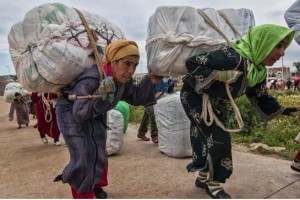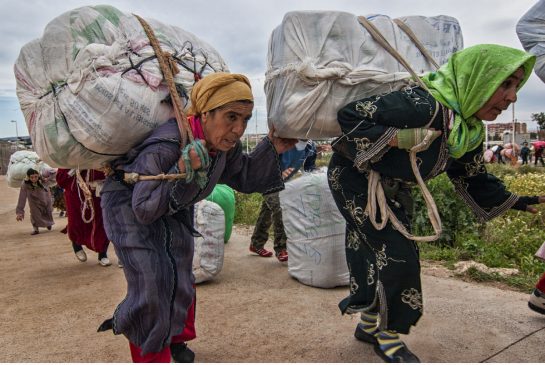 MELILLA, SPAIN—It was early in the morning when Safia Azizi joined the hundreds of other women at the narrow blue turnstiles that separate the unusual Spanish town of Melilla and Morocco.
MELILLA, SPAIN—It was early in the morning when Safia Azizi joined the hundreds of other women at the narrow blue turnstiles that separate the unusual Spanish town of Melilla and Morocco.
The women, most of them elderly, each carried up to 80 kilograms on their back, heading to warehouses in Melilla, a tiny Spanish port that is actually located in North Africa. After unloading their cargo there, they would head back to the traders who hired them in Morocco for another load.
On a good day, after making three round trips, they could earn 15 euros ($20).
But something went horribly wrong that morning. As the Moroccan police opened the barrier, and the women surged toward the turnstiles, Safia Azizi fell.
She was crushed to death in the stampede. An autopsy confirmed the 41-year-old had died due to “a pulmonary hemorrhage caused by a violent chest compression.”
The loads these women carry are the property of the traders, who would have to pay a tariff if the goods were to pass officially through customs, in trucks or containers.
So, they turn to the “porters.” There is no duty on “personal baggage” entering Melilla, which is only 12 square kilometers and is surrounded by a razor wire fence. It was retained by Spain as an exclave when Morocco attained independence in 1956.
Antonio, a city bus driver, tries to make things easier for the women who navigate the unusual European/African border. He takes them closer to the warehouses and brings them back again, so the process is not so tiresome, even helping them on to the bus with their heavy bales.
“What you see here is inhuman, but it happens every day,” he says. “These women carry 300 tonnes of goods daily on their backs.”
The heavy burden means the women often suffer from musculoskeletal disorders.
At noon, a woman rests on a railing, exhausted, the stench of sewer and trash in the air. She walks with difficulty toward the turnstiles, back to where Azizi died.
She stops for a moment and says in broken Spanish: “Early tomorrow . . . the same again.”
By: Fernando Molina-Cortés Special to the Star, Published on Mon Aug 19 2013







